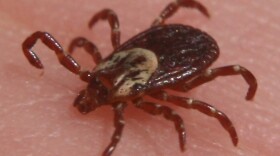Many of our listeners came of age before there was a chickenpox vaccine. In fact, the Centers for Disease Control and Prevention report that studies show that more than 99% of Americans aged 40 and older have had chickenpox, even if they don't remember getting the disease. But once we got done with the fever, blisters, scabs and a week off from school, the varicella virus wasn’t done with us.
I had chicken pox in second grade. The shingles vaccine lies in my future.
According to the Mayo Clinic, shingles is a viral infection caused by the same varicella-zoster virus that causes chicken pox. After you've had chickenpox, the virus lies inactive in nerve tissue near your spinal cord and brain. Years later, the virus may reactivate as shingles and usually manifests as a painful rash. Although shingles can occur anywhere on your body, it most often appears as a single stripe of blisters that wraps around either the left or the right side of your torso. It can also cause fever, headache and fatigue. Sometimes the pain can be so intense, it is mistaken for a problem affecting the major organs. Shingles is more common in older adults and in people who have weak immune systems.
The CDC recommends that people 60 years of age or older should get the shingles vaccine. This vaccine reduces the risk of developing shingles by 51%. It is given in one dose as a shot, and can be given in a doctor’s office or pharmacy.
Resources:
https://www.cdc.gov/vaccines/vpd/shingles/public/index.html
http://www.mayoclinic.org/diseases-conditions/shingles/basics/symptoms/con-20019574






